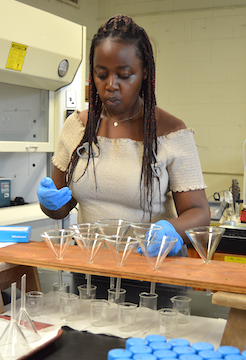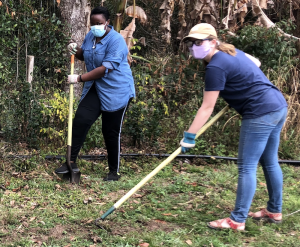Precious Nyabami, a master’s student in the UF/IFAS department of soil, water, and ecosystem sciences, is studying cover crops’ impact on soil health and nutrient management. The focus is on nitrogen (N). She wants to understand N release in the soil under different combinations of cover crops. Her research questions are:
- What are the effects of different cover crop mixtures on nitrogen release – do they hold N or make N release faster?
- How long is the N available in the soil once it is released?
- How do the cover crops subsequently influence some soil health parameters in our system?

When Precious Nyabami was younger, she wanted to be a chemical engineer because it “looked pretty cool.” At her high school in Kigali, Rwanda, she took courses in physics, chemistry, and biology. But a class project building a rainwater catchment system would change her course.
“My friend and I won a national award for the project and had the opportunity to tour the university. When we got to the college of agriculture, they took the time to really show us around,” Nyabami remembered. “I had never thought of it, but this is something that I can envision myself doing because you’re working with farmers.”
She liked the idea of trying out a best management practice, such as planting cover crops, and seeing the benefit in subsequent vegetable harvests.
“From then on, I started thinking more about agriculture and less about chemical engineering,” she said.
Nyabami earned a bachelor’s degree in integrated science at the University of Nebraska (UNL) with a focus on soil science.
“I really liked soil, so that’s why I continued into soil science for my master’s degree,” she explained.
Cover Crop Research
As a sophomore at UNL, Nyabami worked in a soil physics laboratory. Her research project focused on assessing the impact of cover crops on water erosion.
“Before I came to UF, I knew I wanted to work on cover crops and hopefully for nutrient recycling,” she said. “I worked with my advisor, Dr. Yang Lin, as well as Dr. Gabriel Maltais-Landry to develop a project based on some of their existing opportunities.”
For her master’s thesis, Nyabami conducted a litterbag study and an incubation study to assess nitrogen release from cover crops. She selected different cover crop mixtures using sunn hemp, cowpea, sorghum Sudan grass, and millet. Mixtures included one legume and one grass variety and then all four cover crops together. For the second year, she is focusing on assessing potential soil health benefits of the above cover crops in a vegetable production system.

“We have observed that cover crop mixtures marginally slow down nitrogen loss in the first two weeks,” Nyabami said. “However, they enhance N loss one and two months after cover crop incorporation compared to single species.”
She adds that decomposition and N loss is fast in Florida, “by four months, more than 80% of nitrogen from cover crops is lost.”
Dr. Yang Lin, assistant professor of soil health, is Nyabami’s faculty advisor.
“Precious’s research shows that nitrogen is quickly released from cover crop mixtures and made available to the subsequent cash crop, regardless of the mixture composition,” Lin said. “Cover crop mixtures are a great tool for growers to manage nutrients.”
Nyabami said Dr. Lin has played an important role in her master’s program by providing guidance when she hits an obstacle and being supportive of all her endeavors.
Future Plans
After she completes her degree program this summer, Nyabami plans to work in the United States for two years. After that, she will decide whether she wants to return to Rwanda or try to stay in the U.S.
“Agriculture in Rwanda has a long way to go. Some farmers are against using fertilizer because they think it makes the food taste bad,” she said. “I don’t know if I’ll have a greater impact working here in the U.S. or back home.”
Either way, she has a sense for what her ideal job is.
“A job that requires a strong science background, but with a lot of interaction with people,” she explained. “It could be in extension or outreach or the non-profit world. I want to find out what the stakeholder needs and bring the science or solutions to them.”
VoLo Foundation
Nyabami is ending her master’s degree program on an unexpected high note. The VoLo Foundation awarded her its 2022 Vista Award for her graduate research. In particular, the Foundation was interested in the ability of cover crops to sequester carbon. Nyabami says doing so would offset greenhouse gas emissions and improve soil health.
“The cover crops take in carbon dioxide and store it in their stems and roots,” she explained. “That becomes available to soil microorganisms, which eventually benefits the soil.”
The award comes with a $10,000 prize to further develop the project. Nyabami also presented her research at the VoLo Foundation’s Climate Correction™ 2022 conference in March.
She encourages other graduate students to put themselves out there and try for similar awards or opportunities.
“I would say, go for it. Doubting if you deserve it and thinking that there are people more qualified than you is normal,” Nyabami said. “I have learned that we miss 100% of the chances we do not take.”
 5
5
